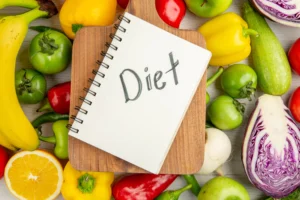
Irritable Bowel Syndrome (IBS) is a common digestive illness affecting the large intestine, resulting in symptoms such as stomach discomfort, bloating, gas, diarrhea, and constipation. While there is no one-size-fits-all treatment for IBS, dietary adjustments can help manage symptoms. Here’s how to customize your diet to better control IBS and enhance your quality of life.
Understanding IBS and the Role of Diet
IBS is a chronic condition that can vary greatly from person to person. Some people may only suffer moderate symptoms, but others may experience a significant impact on their lives. Although the specific etiology of IBS is unknown, it is thought to be a combination of factors such as gut-brain connections, gut motility, and food sensitivity. IBS diarrhea treatment often involves dietary changes as well as medical guidance.
Diet is an important part of controlling IBS. The foods you eat might either exacerbate or relieve symptoms. Because IBS symptoms and triggers differ, your diet should be tailored to your specific needs. Here are some broad guidelines and nutritional recommendations to consider.
Follow a Low-FODMAP Diet
Short-chain carbohydrates known as FODMAPs are not well absorbed in the small intestine. These can ferment in the gut, resulting in symptoms including bloating, gas, and pain. A low-FODMAP diet can help many persons with IBS. FODMAP-rich foods include apples and pears, dairy products, beans, lentils, wheat, and some vegetables.
A low-FODMAP diet involves three stages:
- Elimination: Avoid high-FODMAP foods for a period to see if symptoms improve.
- Reintroduction: Gradually reintroduce foods to identify specific triggers.
- Personalization: Develop a long-term eating plan that balances symptom management and dietary variety.
Eat Small, Regular Meals
Large meals can overwhelm the digestive system, especially in individuals with IBS. Eating smaller, more frequent meals can help you avoid symptoms like bloating and pain. This method aids in maintaining stable blood sugar levels and preventing overeating, which can occur when meals are spaced too far apart.
Identify and Avoid Trigger Foods
Certain foods may exacerbate IBS symptoms. Common triggers include:
- Dairy products: Lactose intolerance is common in IBS patients.
- Fried and fatty foods: These can slow digestion and cause discomfort.
- Caffeine and alcohol: Both can stimulate the intestines and worsen symptoms.
- Carbonated beverages: They contribute to bloating and gas.
One useful tool for identifying personal trigger foods is a food diary. Keep a journal of your diet and any symptoms you encounter. Over time, patterns may emerge that can guide your dietary choices.
Increase Fiber Intake Gradually
Fiber can be a double-edged sword for IBS patients. Foods like oats, bananas, and carrots provide soluble fiber, which helps control bowel motions. Insoluble fiber, which can be found in whole grains and some vegetables, can, however, make some people’s symptoms worse. It’s important to increase fiber intake gradually and pay attention to your body’s response.
Stay Hydrated
Adequate hydration is crucial for overall health and can help alleviate symptoms of IBS, especially if you’re prone to constipation. Drinking plenty of water helps keep stool soft and supports regular bowel movements. Aim for at least 8 glasses of water a day, and adjust based on your activity level and the climate.
Mindful Eating and Stress Management
Stress and anxiety can exacerbate IBS symptoms. Practicing mindful eating—paying full attention to the eating experience and chewing food thoroughly—can help improve digestion and reduce stress. Additionally, incorporating stress management techniques like deep breathing, meditation, or gentle exercise (such as yoga) can positively impact your digestive health.
Consider Probiotics
Probiotics are beneficial bacteria that can help maintain a healthy gut floral balance. Some studies suggest that probiotics can help alleviate IBS symptoms, particularly bloating and gas. However, the effectiveness of probiotics can vary based on the strain and individual differences. It may be helpful to consult with a healthcare provider to find a suitable probiotic supplement.
Limit Artificial Sweeteners
Artificial sweeteners, particularly sorbitol, and mannitol, found in sugar-free gum, candies, and some processed foods, can trigger symptoms in people with IBS. These sweeteners are poorly absorbed in the intestine and can lead to bloating, gas, and diarrhea.
Seek Professional Guidance
While dietary adjustments can significantly help manage IBS symptoms, it’s essential to seek professional advice before making substantial changes to your diet. A registered dietitian or healthcare provider can help you develop a balanced diet plan tailored to your specific needs, ensuring that you get all the necessary nutrients without exacerbating symptoms.
Listen to Your Body
Because IBS is so individualized, what works for one person might not work for another. It’s critical to pay attention to your body and modify your diet as necessary. Be patient with yourself as you experiment with different foods and eating patterns to find what best supports your health and well-being.
Conclusion
Managing IBS with diet involves a combination of identifying triggers, making mindful food choices, and maintaining a balanced and varied diet. While it can be challenging, particularly at the beginning, finding the right dietary plan can significantly improve quality of life and help manage symptoms. For personalized advice, especially related to IBS diarrhea treatment, consult with irritable bowel syndrome specialist Dr. Nisharg Patel in Surat to find the best approach for your unique needs. Remember, it’s about finding what works best for you and making sustainable, long-term changes that support your overall health.
